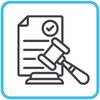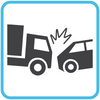Whether you’re starting a new business, experiencing changes, or simply seeking better insurance options, finding the right coverage can feel overwhelming. Insurance companies need a lot of information about your business to determine appropriate coverage options. While some information might be readily available, other details may require more effort to gather. Let’s break down what you’ll need to have on hand and how to obtain a business insurance quote for a smooth and efficient process.
4 Steps on How to Obtain a Business Insurance Quote
1. Evaluate Your Business Risks

The first step is to identify your biggest business concerns, or “worries.” These challenges will define the types of insurance you need. For example, these worries can include customer lawsuits due to injuries, unforeseen property damage, legal action from competitors, or even data breaches from cyberattacks. By understanding these worries, you can choose the insurance policies best suited to protect your business from the financial losses associated with these worries and threats.
2. Explore Insurance Options and Gather Information
Next, research the different types of business insurance policies and the protection they offer. Below are some common options for your business and the information you should have ready when seeking quotes.

General Liability Insurance – Protects your business against bodily injury, property damage, and personal injury claims caused by your operations, products, or services. To acquire a Commercial General Liability (CGL) quote, be prepared to provide:
- Business details: Company name, legal structure, location, industry, and years in operation.
- Operations: Description of your business activities, number of employees, and any potential risks associated with your industry (e.g., working with heights, handling hazardous materials).
- Financials: Annual revenue and estimated annual payroll.
- Claims history: Details of any past claims filed under CGL or similar policies.

Commercial Property Insurance – Commercial property insurance safeguards your company’s physical property, equipment, and inventory against various threats like fire, theft, vandalism, and weather events. When requesting a quote, you’ll need to have:
- Property details: Type of property (owned or leased), year built, size (square footage), location, and construction materials used.
- Inventory details: Estimated value of your inventory and any unique storage requirements for specific items. Most require a separation of personal business property from your property’s betterment (improvements made to the property).
- Business operations: Description of your business activities conducted on the property, including any hazardous materials stored or used.
- Security measures: Details of any security systems, fire alarms, or other risk mitigation measures in place.

Commercial Auto Insurance – Commercial auto insurance is required if you own a business vehicle. It covers you and your employees in case of accidents, injuries, or property damage while driving company vehicles. Be ready to provide:
- Vehicle information: Year, make, model, and VIN of each business vehicle.
- Driver information: Names, licenses, driving records, and estimated annual mileage for each authorized driver.
- Business usage details: Description of how the vehicles are used (e.g., deliveries, sales calls, transporting equipment).
- Loss history: Details of any past accidents or claims involving business vehicles.

Commercial Trucking Insurance – This specialized insurance is crucial for trucking companies and owner-operators and provides coverage similar to a commercial auto insurance policy. When requesting a quote, you’ll need to share:
- Trucking operation details: Type of cargo transported, USDOT information, operating radius (local, regional, or long-haul), and frequency of trips.
- Trucking fleet information: Year, make, and model of each truck, along with any trailers or specialized equipment used.
- Driver information: Same details as commercial auto insurance, with a focus on experience and qualifications specifically for operating commercial vehicles, including commercial driver’s licenses (CDLs).
- Safety record: Details of any past accidents, violations, or safety inspections. Some insurers might request proof of current insurance.

Workers Compensation Insurance – This mandatory insurance covers medical expenses, lost wages, and rehabilitation costs for employees injured or suffering from work-related illnesses. To obtain a quote, you’ll need:
- Employer information: Business name, legal structure, Federal Employer Identification Number (EIN) or Social Security Number (SNN), and physical address.
- Employee information: Total number of employees, job classifications, and estimated annual payroll.
- Claims history: Any past workers’ compensation claims filed by your employees can impact your premium and even your eligibility for coverage. Be prepared to disclose details like the nature of the claim and costs incurred.
3. Shop Around and Get Several Business Insurance Quotes
Once you’ve identified what kind of business insurance you need and gathered the necessary information for quotes, your next step is to compare quotes from several insurers to find the most competitive rate and optimal coverage. There are two main avenues you can use; Firstly, you can directly contact a trusted insurance provider if you have one. While this method offers familiarity, obtaining quotes from different companies can be time-consuming and overwhelming.

Alternatively, consider using an insurance marketplace like AIS Insurance. Insurance marketplaces partner with numerous reputable insurance providers, allowing you to effortlessly compare quotes from various companies all in one place. By utilizing platforms like AIS Insurance, you can streamline the process of obtaining quotes from multiple insurance carriers. For a list of our trusted business insurance partners, visit our website here.
4. Review Quotes and Purchase Policy
While the cheapest insurance policy might seem tempting, here are a few items you’ll want to keep in mind:
- Coverage: Understanding what your policy covers and excludes is paramount. Don’t hesitate to ask questions and read the fine print. For instance, if you’re purchasing commercial property insurance, understand that it does not cover flood or earthquake damage, so you’ll want to be sure you know specifically what type of coverage your policy covers.
- Limits of Liability: The limits on your policy will tell you the maximum amount your insurance company will cover. For example, a general liability policy has limits of $1 million per claim and $2 million total over a year. Of course, the higher limits you need, the more you’ll pay.
- Premium and Deductible: The premium is your annual or monthly cost, while the deductible is the amount you pay out of pocket before coverage kicks in. Generally, the higher your deductible, the lower your premium, and vice versa.
- Carrier Rating: Finally and most importantly, you’ll want to choose a reputable insurance carrier by checking their A.M. Best Rating. The A.M. Best Rating system is a letter grade system that shows the financial health and operating performance of a company. Generally, an A- rating or higher is considered strong, so you’ll want to see where your insurance carrier falls before agreeing to purchase a policy from them.
After securing your business insurance policy, familiarize yourself with the payment schedule, claim filing process, and customer service contact information. Regularly review your coverage, especially during annual renewals, to ensure it aligns with your evolving business needs and risks.
Get a Business Insurance Quote with AIS Insurance
Let our team of experienced Commercial Insurance Specialists help you navigate insurance options and find the best protection for your business. Contact us today at (866) 570-7335 for a quick and easy free business insurance quote.
The information in this article is obtained from various sources and offered for educational purposes only. Furthermore, it should not replace the advice of a qualified professional. The definitions, terms, and coverage in a given policy may differ from those suggested here. No warranty or appropriateness for a specific purpose is expressed or implied.


